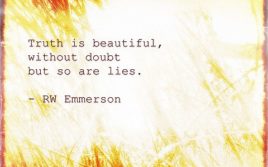Transcript
“A lie can get halfway around the world before the truth can get its boots on,” said Winston Churchill. If that was the case then, how much more valid is it today. The explosion of social media and its ability to circulate and generate misinformaton has completely changed the political landscape.
And it has led to a whole new branch of journalism – political fact-checking.
This interview was first posted on the New Books Network and was conducted in the heat of the 2016 US Presidential Election campaign. In it, Lucas Graves, assistant professor in the school of journalism and mass communication at the University of Wisconsin Madison talks to James Kates about the emergence of fact checking as a necessary, if often maligned , attempt to get at the this elusive thing called ‘truth’.
As George Orwell said, “Political language is designed to make lies sound truthful and murder respectable….”
Lucas Graves book, Deciding What’s True: The Rise of Political Fact-Checking in American Journalism came out in 2016 from Columbia University Press
Tags: Fact-checking, journalism, Presidential campaign 2016, social media



Leaving Trump’s use of the phrase “alternative facts” aside, this points towards something as relevant as (checking) whether something is actually a fact or not. The issue of which facts are selected, presented, promoted is arguably more crucial, more dangerous.